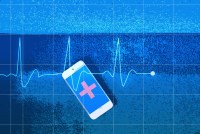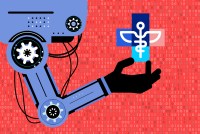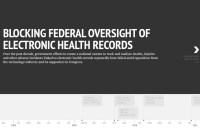Latest KFF Health News Stories
Blind to Problems: How VA’s Electronic Record System Shuts Out Visually Impaired Patients
Veterans Affairs’ electronic health records aren’t friendly to blind- and low-vision users, whether they’re patients or employees. It’s a microcosm of America’s health care system.
Reporter Follows Up on ‘Cancer Moonshot’ Progress and the Bias in Digital Health Records
KHN and California Healthline staff made the rounds on national and local media this week to discuss their stories. Here’s a collection of their appearances.
Apple Aims to Push More Patient Data to Doctors. But Who Can Gauge Its Impact on Health?
The Silicon Valley giant has been cryptic about its plan for the growing mound of health data available through its iPhones and watches. Health systems have experimented with the company’s health app, but it hasn’t yet become central to treatment.
Huge Gaps in Vaccine Data Make It Next to Impossible to Know Who Got the Shots
Details about race, ethnicity and occupation are often missing as data collected nationally is scattered across scores of digital systems that don’t connect. And the CDC doesn’t require vaccinators to report occupations of recipients, even though the order in which people get shots largely depends on their job.
As Coronavirus Strikes, Crucial Data In Electronic Health Records Hard To Harvest
The U.S. government spent $36 billion computerizing health records, yet they’re of limited help in the COVID-19 crisis.
KHN’s ‘What The Health?’: Coronavirus Goes Viral
The rapidly spreading coronavirus has led to the cancellation of sporting events, conferences and travel, with Congress and President Donald Trump scrambling to catch up to the spiraling public health crisis. Meanwhile, the Trump administration has issued long-awaited rules aimed at making it easier for patients to carry copies of their medical records. Margot Sanger-Katz of The New York Times, Paige Winfield Cunningham of The Washington Post and Kimberly Leonard of Business Insider join KHN’s Julie Rovner to discuss this and more. Also, for extra credit, the panelists suggest their favorite health policy stories of the week they think you should read, too.
New Federal Rules Will Let Patients Put Medical Records On Smartphones
Patients would have far more control over their health care with complete medical histories stored on their phones, proponents say.
How Fast Can A New Internet Standard For Sharing Patient Data Catch Fire?
The web-based standard FHIR — pronounced “fire” — could hasten the day when we can view our full medical histories on a smartphone screen. Tech giants are hungry for a piece of the pie, but obstacles remain.
A Reality Check On Artificial Intelligence: Are Health Care Claims Overblown?
As happens when the tech industry gets involved, hype surrounds the claims that artificial intelligence will help patients and even replace some doctors.
Electronic Health Records Creating A ‘New Era’ Of Health Care Fraud
The federal government funneled billions in subsidies to software vendors and some overstated or deceived the government about what their products could do, according to whistleblowers.
Timeline: History Of Blocking Regulation Of Electronic Health Records
Over the past decade, government efforts to create a national system to track and analyze deaths, injuries and other adverse incidents linked to electronic health records repeatedly have failed amid opposition from the technology industry and its supporters in Congress.
No Safety Switch: How Lax Oversight Of Electronic Health Records Puts Patients At Risk
Special interests and congressional inaction blocked efforts to track the safety of electronic medical records, leaving patients at risk.
Startup Seeks To Hold Doctors, Hospitals Accountable On Patient Record Requests
Despite laws requiring that health care providers hand over copies of patient records in a timely fashion, many people have trouble getting theirs. Ciitizen, a Palo Alto, Calif., company that helps cancer patients with the task, recently published a scorecard that rates hospitals, doctors and clinics on their compliance with records requests.
When A Doctor’s Screen Time Detracts From Face Time With Patients
Electronic health records can help reduce medical errors, but when not used well they can strain the doctor-patient relationship. Dr. Wei Wei Lee, an internist with the University of Chicago Medicine, has developed strategies to make sure tech is a tool, not a barrier.
Why You Should Take A Peek At Your Doctor’s Notes On Your Health
Some patient advocates say your doctor’s notes offer insights you might never hear from your physician, putting patient and provider on the same page.
KHN’s ‘What The Health’: Who Will Pay To Fix Problem Of Surprise Medical Bills?
Lawmakers and patients want to eliminate “surprise” out-of-network medical bills. Hospitals, doctors and insurers say they want to eliminate them, too, but their opposition to one another’s proposals could complicate legislative efforts. Stephanie Armour of The Wall Street Journal, Alice Miranda Ollstein of Politico and Kimberly Leonard of the Washington Examiner join KHN’s Julie Rovner to discuss this, plus the latest in news about reproductive health and health care sharing ministries.
Feds Want To Show Health Care Costs On Your Phone, But That Could Take Years
Giving consumers more knowledge about the costs of care has long been desired, but administration officials cautioned it could take two years or more for useful data to appear in a phone app.
Watch: Electronic Medical Records Investigation In Spotlight On C-SPAN
KHN’s Fred Schulte talks on C-SPAN with viewers about errors and other problems with computerized health records.
Readers And Tweeters Chime In On Investigation Of Electronic Health Records
Kaiser Health News gives readers a chance to comment on a recent batch of stories.
New Rules Will Ease Patients’ Access To Electronic Medical Records, Senate Panel Says
Sen. Lamar Alexander (R-Tenn.), head of the influential HELP committee, wants to make it easier to share and store detailed medical histories.
























